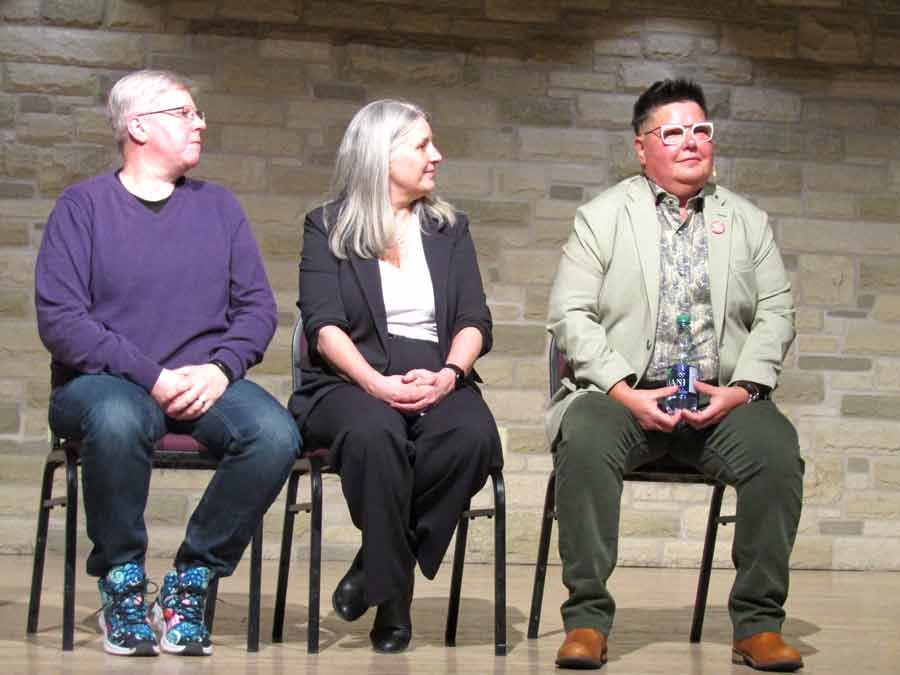*Warning: This story contains details about intimate partner violence.
GUELPH – If you’re going to make friends with the future, you’re going to have to face the past, said Layne, the Auctionista, at an International Women’s Day event in Guelph hosted by Guelph-Wellington Women in Crisis .
Their talk ‘Making Friends with the Future’ at the Guelph Youth Music Centre on March 8 was moving, powerful, and riveting.
“I’m going to break your heart,” said Layne (they/them), as they began the hour-long talk that explored abuse at the hands of their husband, a decade of looking over their shoulder wondering if he would make good on his threat to kill them, and finally coming to terms with who they are and what they want from life.
Layne’s parents were immigrants, and religion and culture were important to them growing up.
And they followed the prescribed route to happiness – get married, have kids and be happy with that.
They met the man who would become their husband in 1978. He was attentive and Layne believed it was love.
In those days, “if you were gay, you were not OK,” they said, “Nobody talked about it. There was no representation on TV. I had nobody to look to as a guiding light, I had nobody. So I just tucked it away. Tucked it away, deep, deep down inside.”
At the same time, their husband became increasingly abusive.
But they didn’t talk to anyone about this either and kept hoping life would get back on track, eventually having a second child.
One night the two had a huge fight. He was violent and after some blows, “I was seeing stars,” they said.
“I said I would call police; he said, ‘I will kill you.’”
It took seven years to divorce and another 10 to get over the triggers that just seeing the kind of vehicle he once drove would cause.
By the time they were approaching 40, Layne was still figuring out their sexual identity and still trying to find someone to share their life with.
Then they met Sue and a lot of pieces fell in place. They found a lesbian community and finally felt “home.”
“Belonging is a powerful word,” they said. “Being inclusive does not mean belonging. Being inclusive means you’re a part of a team.
“You’re like, ‘Hey, you want to come to the party with us? You’re invited here.’
“But when you belong, when you truly belong somewhere, it is that feeling of coming home, where you can be totally yourself. You’re completely authentic. And you’re completely relaxed in who you are and how you are. That is belonging. And that is what we found at that moment.”
Layne and Sue married in 2013. And while Layne had a successful career as a financial advisor, something was missing from their life.
For a host of reasons, they decided to become an auctioneer and headed to the World Wide College of Auctioneering in Iowa.
“Auctioneering is a generational career,” they said, adding they were not immediately welcome at the school.
“I felt vulnerable. I wanted to go home.”
But they stayed, completed the course, and even managed to make friends with some of the participants.
Back in Canada, they worked hard to build a career as The Auctionista, who often hosts gala fundraisers, live and silent auctions, and has raised over $40 million for various causes over the years.
“I created a job, a company, a brand and a lifestyle,” they said. “I did well, but gender discrimination is real. And it is ugly.”
Layne said they are constantly asked if they are a man or a woman. They’ve experienced hatred and what they call “invasive curiosity.”
In 2015 they changed their name to Layne, the Auctionista.
“When I claimed my name, I claimed my identity. Life got better.”
2020 was a challenge as all their events were cancelled.
“The pandemic magnified vulnerabilities. I had to reinvent myself – again.”
Focus on social justice
Now they are focused on social justice causes. They give motivational talks, like this one, and encourage people to be their best self.
To do that, you have to leave your comfort zone, they said. You have to feel the fear of trying something new – that’s when you experience growth.
After Layne’s talk there was a panel discussion were shelter program manager Christine Wilson and rural women’s support program, crisis line, public education and volunteer manager Jacinta Cassidy took questions from the audience.
Cassidy noted that 94 municipalities, including Guelph, have declared intimate partner violence an epidemic and she hopes Wellington County will make a similar declaration.
“It sends a message of support to survivors. There’s no stigma or shame in getting help. We hope this will pressure the province to increase funding,” she said.
“I hope it’s not just lip service,” added Wilson.
The best thing to do if someone reaches out to you for help, is to listen – and to believe them.
And if you are connected to the person causing the harm, have a respectful and private conversation with them.
“The minute we judge and condemn, people close their ears,” Cassidy said.
As for the apparently growing anti-gender movement, Layne says training on diversity, equity and inclusion is so important.
“The impact could be profound,” they said.




